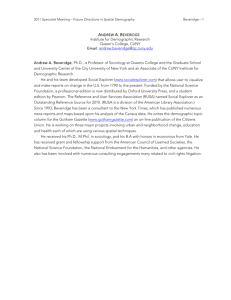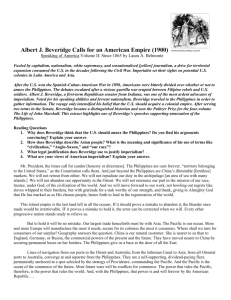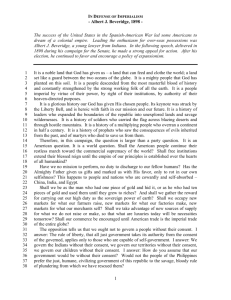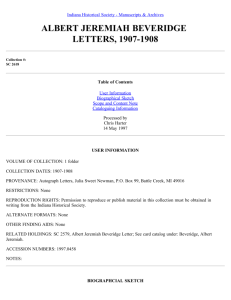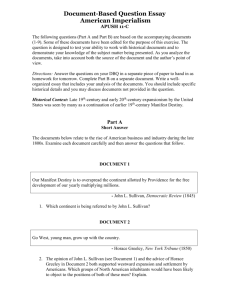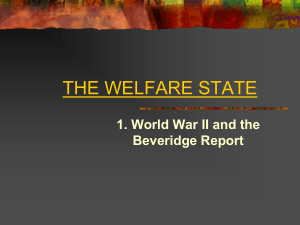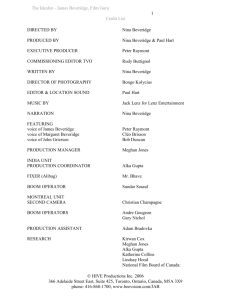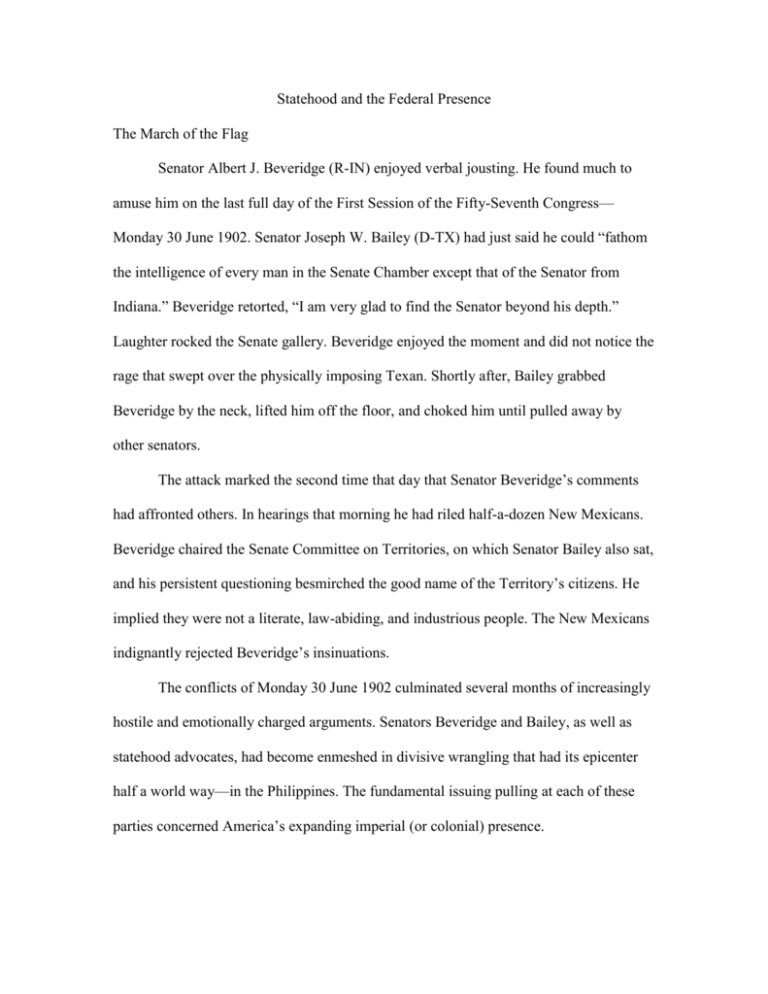
Statehood and the Federal Presence
The March of the Flag
Senator Albert J. Beveridge (R-IN) enjoyed verbal jousting. He found much to
amuse him on the last full day of the First Session of the Fifty-Seventh Congress—
Monday 30 June 1902. Senator Joseph W. Bailey (D-TX) had just said he could “fathom
the intelligence of every man in the Senate Chamber except that of the Senator from
Indiana.” Beveridge retorted, “I am very glad to find the Senator beyond his depth.”
Laughter rocked the Senate gallery. Beveridge enjoyed the moment and did not notice the
rage that swept over the physically imposing Texan. Shortly after, Bailey grabbed
Beveridge by the neck, lifted him off the floor, and choked him until pulled away by
other senators.
The attack marked the second time that day that Senator Beveridge’s comments
had affronted others. In hearings that morning he had riled half-a-dozen New Mexicans.
Beveridge chaired the Senate Committee on Territories, on which Senator Bailey also sat,
and his persistent questioning besmirched the good name of the Territory’s citizens. He
implied they were not a literate, law-abiding, and industrious people. The New Mexicans
indignantly rejected Beveridge’s insinuations.
The conflicts of Monday 30 June 1902 culminated several months of increasingly
hostile and emotionally charged arguments. Senators Beveridge and Bailey, as well as
statehood advocates, had become enmeshed in divisive wrangling that had its epicenter
half a world way—in the Philippines. The fundamental issuing pulling at each of these
parties concerned America’s expanding imperial (or colonial) presence.
Anger turned white-hot over allegations of U.S. Army atrocities in the
Philippines. In the Committee on the Philippines, on which Senator Beveridge also sat, as
well on the Senate floor, pro-imperialist Republicans squared off against anti-imperialist
Democrats. The supercharged atmosphere was primed for an explosion. Almost anything
could have set it off, but Beveridge’s goading of Bailey provided the spark during a
dispute about an unrelated issue. A letter to the editor of the New York Times following
the attack reminded everyone of Beveridge’s culpability because of his taunts.
It comes natural to Senator Beveridge and all the rest of the imperialists to
impute dishonest motives to those who differ from them on the Philippines.
Ridiculing, as they do, broad and general principles and calling them ephemeral,
their argument is petty and personal.
Beveridge extended his practice too far. A few more precedents,
commenced by Senator Bailey, ought to be established.
U.S. imperialism in the Philippines became entwined in the politics of statehood
because Senator Beveridge planted himself at very center of both issues. His views on the
Philippines and New Mexico mixed righteous certitude with petulance. In promoting
imperialism on the one hand while postponing statehood for New Mexico and Arizona on
the other, he proved unyielding as a defender of the right to control each. To understand
his attachment to colonialism, it is necessary to look back a few years. In the summer of
1898, Beveridge seized a political opportunity and quickly emerged as a foremost
champion of “America’s God-given duty” to dominate other cultures.
Veterans of a Civil War contingent from Indianapolis marched to Albert J.
Beveridge’s home and escorted him to the state’s Republican Party Convention in mid-
September 1898. There his keynote speech electrified several thousand. The ceremonial
honor guard, as well as the delegates’ enthusiastic response, underscored how fully
military and civilian support coalesced in Beveridge’s message. His convention address
metaphorically thrust the flag of the United States through the heart of the fledging
independence movement in the Philippines, and in doing so he also pierced the soul of
nuevomexicanos.
Casualties were not Beveridge’s concern—he had a U.S. Senate seat to secure.
Ever since a speech in Boston the previous April, Beveridge had attracted national
attention by his strident calls to strike against Spain’s crumbling empire and place its
commerce and territory under American control. Soon President William McKinley
embraced the imperialist mission that Beveridge advanced.
The thunderous applause that greeted Beveridge’s keynote address signaled
widespread Republican support for his imperialist message:
Would not the people of the Philippines prefer the just, humane, civilizing
government of this Republic to the savage, bloody rule of pillage and extortion
[by Spain] from which we have rescued them? . . . . Will you remember that we
do but what our fathers did . . . we only continue the march of the flag?
Beveridge whipped up imperialist impulses in his relentless campaigning for the
Republican Party throughout the fall of 1898. He passing out several hundred thousand
copies of his Indianapolis speech, and “The March of the Flag” became a rallying call
across Indiana. Republican candidates triumphed and took control of the state legislature.
One of their first acts involved selecting a new United States Senator to succeed the
incumbent Democrat, whose term would expired in early March 1899.
They convened in January 1899 and waded through seven rounds of balloting.
Finally Albert J. Beveridge emerged victorious from the field of eight aspirants. A
fateful irony exists in his selection: the leading contender had been former New Mexico
Territorial Governor Lew Wallace (1878-80), who bowed out the previous spring, thus
opening the door for Beveridge to go to the U.S. Senate.1 Beveridge savored the acclaim
and national recognition accorded his election by newspapers such as The Los Angeles
Times: “Senators will find in the young giant from Indiana a new power among them.”
Such attention and respect stoked his already considerable ambition. He began to look
ahead and compared himself to another favorite son of Indiana—Benjamin Harrison.
They lived only three blocks apart, and Harrison, too, had been a lawyer from
Indianapolis, and had—a decade earlier—gone from his first term in the U.S. Senator to
being twenty-third president of the United States (1889-1893).
Beveridge believed himself worthy to occupy the White House and thought his
opportunity would come in 1904 when he expected President William McKinley to
complete his second term. Only thirty-six years old, Beveridge just met the Constitution’s
age requirement to serve in the senate. His trim, muscular body—five foot eight inches,
158 pounds—barely contained his seemingly limitless energy, and few anywhere could
equal the power of his oratory.
He carried to Washington a clear vision of what imperialism offered. As he
argued in “The March of the Flag”:
The question is larger than a party question. It is an American question. It is a
world question. Shall the American people continue their march toward the
commercial supremacy of the world? Shall free institutions broaden their
blessed reign as the children of liberty wax in strength until the empire of our
principles is established over the hearts of all mankind?
In his Indianapolis keynote address, Beveridge repeatedly stressed the economic
necessity of empire. This topic resonated well with his Republican audience because of
the country’s slow recovery from the financial collapse associated with the Democratic
Party in the Panic of 1893, a ruinous economic downturn that lasted much of the rest of
the decade. Beveridge’s imperialism provided a prescription for reclaiming fiscal vigor.
He framed his vision around New Testament allusions. In his gospel of earthly wealth,
economic salvation required opening new markets to purchases of American produce and
products. Only in this way could farmers and businesses rebound from the past four
calamitous years:
Shall we be as the man who had one talent and hid it, or as he who had ten
talents and used them until they grew to riches [Matthew 25: 14-30]? And shall
we reap the reward that waits on our discharge of our high duty; shall we occupy
new markets for what our farmers raise, our factories make, our merchants sell—
aye, and please God, new markets for what our ships shall carry?
Empire-building in Beveridge’s speech meant, first and foremost, tapping into purchasing
power, especially in the Far East, to overcome the business downturn that began one
month into President Grover Cleveland’s tenure (1893-97) and lingered still in 1898.
But was there more to Beveridge’s imperialism? Did it reveal some fundamental
principle that guided his political ideals? The answer to both questions is “Yes.”
Specifically his ideas about the Philippines are inseparable from his contempt for Spain,
and by extension, New Mexico.
Beveridge embraced empire-building because it abetted a century-long process
of undermining Spain’s status as a colonial power, especially in the New World. Pushing
aside Spain had produced a long string of “victories” for the United States in the
nineteenth century. The roll call included: in 1803 purchasing more than 828,000 square
miles of Louisiana Territory extending from the Mississippi River to the Rocky
Mountains, which Spain had yielded under duress to France in 1800; forcing Spain to
cede Florida in 1819; enunciating the Monroe Doctrine in 1823 to shield the emerging
nations of the southern hemisphere from European powers; taking over Spain’s former
frontier territories in Texas, the Southwest, and California between 1835 and 1848; and
finally expelling Spain from its colonial outposts in the Philippines, Cuba, and Puerto
Rico in 1898 and claiming dominion in the Caribbean, the new “American lake.”
Military triumph over Spain in 1898 thrust America onto the world as a new
power. Colonialism for Beveridge, as he argued in “The March of the Flag,” merely
extended the nation’s expansion westward into the Pacific Ocean—to Hawai’i and the
Philippines—as well as southward to Cuba and Puerto Rico in the Caribbean.
Beveridge’s believed that imperial rule accrued to America because of its superiority over
weaker, so-called unfit nations. Spain’s imperial motives in the fifteenth and sixteenth
centuries, it has been argued, stemmed from a quest for God, gold, and glory. At the turn
of the twentieth century, Beveridge argued for empire in terms of Providence, profits, and
politics.
When Beveridge entered the Senate in early March 1899, many Americans shared
his world view that “the rule of liberty that all just government derives its authority from
the consent of the governed applies only to those who are capable of self-government.”
Excluded were peoples deemed inferior to successful white, English-speaking, American
Protestants. One historian noted the following in situating Beveridge’s ideas within
intellectual currents and rationalizations coursing through America at the turn of the
twentieth century:
The movement [Social Darwinism] took its rationale from more general
ideological conceptions. The appeal of Anglo-Saxonism was reflected in the
adherence to it of political leaders of the expansion movement. The idea of
inevitable Anglo-Saxon destiny figured in the outlook of Senators Albert
Beveridge and Henry Cabot Lodge and of John Jay, Theodore Roosevelt’s
Secretary of State, as well as of the President himself. During the fight for the
annexation of the Philippines . . . expansionists were quick to invoke the law
of progress, the inevitable tendency to expand, the Manifest Destiny of
Anglo-Saxons, and the survival of the fittest.
Albert J. Beveridge espoused two powerful, pathological strains in American
thought at the turn of the twentieth century—colonialism and racism. These ideas also
informed his opposition to New Mexico’s statehood. In his address at Indianapolis,
Beveridge told his audience that no current U.S. territory was capable of self-rule. With
regard to New Mexico, he reminded his audience it “had a savage and alien population.”
Beveridge’s critique of unfit peoples in “The March of the Flag” had three interrelated
themes: their limited capacity for self-government; white superiority over vestiges of
defeated colonial powers; and providential destiny. Beveridge believed that the Philippines
and New Mexico were incapable of self-rule, which necessitated, in his view, that “we
govern our territories without their consent.” Moreover, because “American energy is
greater than Spanish sloth,” all improvements in former colonial areas came about only as
“the empire of our principles is established.” Finally, guiding and consecrating this whole
process was the divine will that unfolded in a rapturous quest:
It is a glorious history our God has bestowed upon His chosen people . . .
a history of soldiers who carried the flag across blazing deserts and
through the ranks of hostile mountains even to the gates of sunset. . . . We
cannot retreat from any soil where Providence has unfurled our banner; it
is ours to save that soil for liberty and civilization.
Wrapping himself in the imperialist cause when he entered the Senate,
Beveridge’s fiery speeches on the Philippines garnered him favorable and widespread
attention. Friendly and frequent coverage in Republican newspapers nationwide in 1900
and 1901 fanned his political ambition. His party’s leaders in the senate took notice of his
abilities—and ambition. Senator Henry Cabot Lodge (R-MA) gave Beveridge wide
latitude as an administration spokesperson on the Philippines, both in the Committee on
the Philippines, which Lodge chaired, and in the Senate itself. Beveridge continued to
garner newspaper coverage, but he realized that he needed other issues besides
imperialism to capitalize on—as well as keep his name in the headlines.
Senate Republican leaders recognized Beveridge’s debating skills, mastery of
parliamentary tactics, and quickness in gaining expertise on any topic he set his mind to
pursue. These qualities made him the ideal person to navigate the difficult issue of
statehood. The matter of Territories had recently emerged as a contentious, important
political issue in many parts of the country. In December 1901 the junior senator from
Indiana, in congress less than three years, took over as chair of the Senate Committee on
Territories.
© 2008 by David V. Holtby. All rights reserved

![1927.] Obituaries 181 ALBERT JEREMIAH BEVERIDGE Albert](http://s3.studylib.net/store/data/008265495_1-dbb1462976881bcdd0f4f3f4ff281742-300x300.png)
